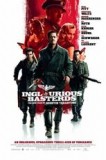| Reviews & Columns |
|
Reviews DVD TV on DVD Blu-ray 4K UHD International DVDs In Theaters Reviews by Studio Video Games Features Collector Series DVDs Easter Egg Database Interviews DVD Talk Radio Feature Articles Columns Anime Talk DVD Savant Horror DVDs The M.O.D. Squad Art House HD Talk Silent DVD
|
DVD Talk Forum |
|
|
| Resources |
|
DVD Price Search Customer Service #'s RCE Info Links |
|
Columns
|
|
|
Inglourious Basterds
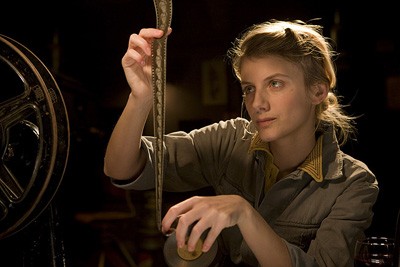
Quentin Tarantino's Inglourious Basterds is a whole lot of movie. Some of it is undeniably flawed, starting with that stupid misspelled title, but most of it undeniably great. I'd say 90% of it is overwhelming in how good it is. Surprising, too, especially after the mixed response coming out of Cannes. I think everyone was poised for Q.T. to blow it. He doesn't even come close. Instead, he shows that there is a mature Tarantino, the one that has been emerging over Kill Bill 2 and Death Proof, still talkative but prone to longer sentences and drawn to more complex topics. He's mostly emerged fully grown in Inglourious Basterds, leaving the finger-snapping cool behind. Mostly.
Basterds is structured as a film with multiple chapters, the first couple set aside to introduce each element of the multilayered story, the final half to bring those elements together. The first chapter, a scintillating mini film all on its own, introduces us to "the Jew Hunter," Col. Hans Landa (Christoph Waltz), who is roaming the French countryside ferreting out enemies of the state. This starting piece is a tiny epic of two men squaring off mentally, and one man thoroughly winning. From his first words in the script, Waltz's Landa becomes the guy to watch and, more importantly, listen to. The actor is comfortable with Tarantino's language, cherishing every syllable, living in the words like it's a space suit and it's the only way he can breathe. Landa enters the canon of slimy screen villains who somehow draw us in even as they repel us. He's a real piece of work, and watching him is a delight. As Death Proof showed, Tarantino has become a master of the slow burn, and this one-on-one is just the first of many similarly tense set-ups throughout Inglourious Basterds.
On a whim, Landa lets a young girl escape. Shoshanna (Mélanie Laurent), as we will discover in chapter 3, grows up to own a movie theatre in Occupied Paris. When she is spied by a young Nazi hero turned film star, Fredrick Zoller (Daniel Brühl), he takes a shine to her and arranges to have his film premiere at her cinema. With the promise that Joseph Goebbels (Sylvester Groth) will be there, alongside the top SS brass and even Hitler himself (played with a grotesque comic edge by Martin Wuttke), Shoshanna sees a unique opportunity to get her revenge. Landa will even be providing security. The girl could topple a nation with one little match.
As it turns out, the allies have had the same thought, and they are organizing Operation Kino. A British spy (Michael Fassbender) will rendezvous with a German film star (Diane Kruger), who is a double-agent and can get him into the movie premiere. Providing the link between the two and also giving the Brit back-up will be the Basterds, a collection of Jewish-American soldiers who have been operating behind enemy lines and striking fear into the German forces for some time. These secret service operatives are led by Lt. Aldo Raine (Brad Pitt), a.k.a. the Apache, so named for his alleged Native American heritage and his demand that his boys scalp all the Nazis they kill. The Basterds are a violent ambush team. If they attack a squad, barely anyone gets out alive; the only survivors are allowed to leave in order to tell the tale, and they will wear the mark of the Basterds in doing so.
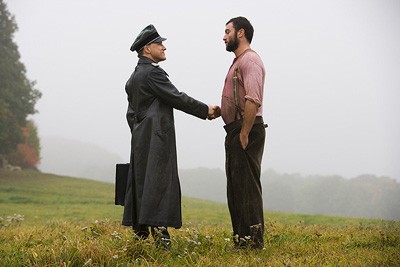
Tarantino takes his time building all of these elements. The unaligned characters are more than pieces on a game board, he wants them all to live and breathe. Even the pretty-boy sniper Zoller has some depth to him. It's actually only the Bastards that play to types, being functions of the same dark, satirical propaganda that sees the director remodel the Nazi higher-ups as humorous buffoons. They are still twisted cretins, but he'd rather deflate their images than add to their creepy legends.
Though there are several scenes of violence and gore that most will go to Inglourious Basterds expecting to see, this film is a far more layered piece than the trailers lead on. Quentin Tarantino is trying to have his cake and eat it, too. On one hand, he's delivering the "grindhouse" exploitation picture where Eli Roth crushes Nazi skulls with a baseball bat; on the other, he's delivering us a rich, misshapen epic not dissimilar to the work of Leone or Bertollucci. Much of the filmmaking here is beautiful and sophisticated, with countless breathtaking shots and densely manicured set pieces. Just as with his other films, Basterds is a showcase for a gifted filmmaker to serenade the cinema that inspired him, only here he is saluting better movies (Clouzot's Le corbeau is referenced on screen; Melville's Army of Shadows, one could assume, is as much of a reference point as the Enzo G. Castellari film Q.T. borrowed his title from) and being far less obvious about it. He has folded the filmic love letter into the story, borrowing maybe a little from Truffaut's The Last Metro, making his Resistance tale about show people and how they stood their ground. Tarantino's history is cinema, cinema is his history.
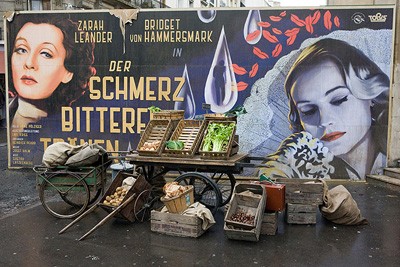
Thus we have German propagandist Leni Riefenstahl juxtaposed against the more subversive Clouzot, whose Le corbeau was misunderstood at the time since he made his political allegory under Goebbels' supervision. There is also a nod to Lilian Harvey, the German actress that defied Goebbels, and who is likely the inspiration for Diane Kruger's Bridget von Hammersmark. For his brief detour to Britain (complete with a splendid Mike Myers cameo), Tarantino shifts his style to match England's wartime films. Bits of music are borrowed from a list of flicks as long as your arm. Best of all, with the main mission being set in a movie theatre, the writer/director can even make the plot hinge on moviegoing. Here cinema will deliver the wish-fulfillment it has always promised. The final act featuring Pitt and his boys in tuxedos pulling a con is a hoot. Call it Ozean's Elf, if you will. Pitt does with Aldo the same thing he did with Rusty in those Soderbergh pictures, or more recently as Chad in Burn After Reading: he starts with something akin to caricature and turns it into a more memorable persona. Aldo, with his odd accent and particular syncopation, is the kind of sly devil that makes you wish a movie like this one might actually become a franchise.
Actually, had Tarantino been willing to chop up Basterds, he could have made at least three movies I'd have gladly watched. I certainly wouldn't have minded more of Shoshanna's story. Mélanie Laurent is a real find, looking like a more soulful Sondra Locke, an unlikely heroine who proves she's more than her appearance might lead one to believe. Of all the many stand-out performances in the film, it's hard to decide if Laurent or Christoph Waltz deserves top honors. In the one scene they share, they are evenly matched, and she never lets his wolfish charisma swallow her up.
If all this is so good, then what is wrong with Inglourious Basterds to keep it from receiving unqualified praise? It's not a lot, really only a handful of moments in an otherwise exquisite film, but it's the kind of stuff that should be noted because it's where Quentin Tarantino gets in his own way, the holdovers that keep the manchild director from growing into a journeyman auteur. The one positive of a World War II setting in terms of style is that is should have forced Q.T. to stay away from the pop culture references that have now started to hurt him as much as they initially helped him. (Much the way Dollhouse has allowed Joss Whedon to get away from the oft-imitated Joss Whedon style by having a character that is constantly being reverted back to a blank slate.) While Tarantino manages to keep himself reined in the majority of the time, he still gets indulgent, and he was desperately in need of someone to step in and tell him no.
This leads to such aesthetic anachronisms as the 1970s style profile of Sgt. Hugo Stiglitz (Til Schweiger), complete with a groovy logo and Samuel L. Jackson narration. It's a fun story, but it's the only such diversion we get, and either we needed to see a similar flashback for each Basterd so that this one was more integrated into the movie, or Tarantino needed to find a less showy way to fit this diversion into the mix. Likewise, having Jackson in for this and only one other scene makes no sense, especially as the information delivered in the second bit of voiceover was already given to us in the preceding dialogue. At the back end, a bombastic music cue during a showdown in the projection booth is so over-the-top that it tips the director's hand as to what's coming. Worse, though, is the use of David Bowie's "Cat People (Putting Out Fire)" for an extended sequence where Shoshanna prepares for the movie premiere. It's out of place, too on-the-nose, and not only does the director lift the tune from a bad movie (Paul Schrader's 1982 Cat People remake), but it's not even a good Bowie song! You're better than that, Quentin.
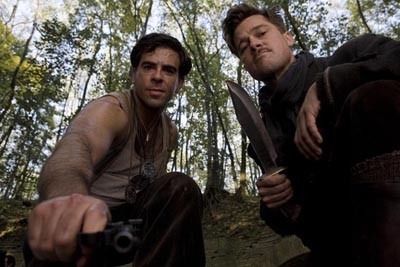
I suppose one good thing could have been that Tarantino didn't give himself a role in Inglourious Bastards, except he invalidates that boon by giving a fairly prominent part to his buddy Eli Roth, the director of the Hostel movies. If you think those films lacked subtlety, wait until you see Roth's hammy performance as the sadistic "Bear Jew." Just like Tarantino when he double-dips as an actor, Roth overdoes everything, and he never sits still. If he is standing behind another actor talking, you can bet he's still mugging for the camera, doing his best to upstage the important player. If a regular extra did this to either of these guys in their movies, they'd have those extras fired; I guess in the director bro code, your best pal ranks over the integrity of your scene.
Thankfully, these stumbles all pass rather quickly, and it's not so hard to develop an Eli Roth blind spot where he fades out of focus whenever he's on screen. Even during the overlong Bowie sequence, one can drift back and look at how pretty everything is. Cinematographer Robert Richardson, who regularly works with Oliver Stone and Martin Scorsese in addition to Quentin Tarantino, has shot a visually delicious film, full of rich, sumptuous colors and expansive framing. The look of the film had to be grandiose, nothing else would serve the full expanse of the script properly. For all the classic, straight-on shots, Richardson and Tarantino also keep it moving, going in for a dizzying spin or contemplative pan when the need arises. Again, it's these carefully chosen moves that make the hiccups all the more aggravating. Artistry is as much about self-control as it is about chasing one's imagination to the limit.
Inglourious Basterds has been years in the making. More than a decade by this point, maybe. It began to look like the WWII movie that Quentin Tarantino had been wrestling with would never be tamed, it was the project that would get the better of him. Now that it's done, it's easy to see why it might have been so tough. The ambition and the effort have really paid off, though, and Tarantino continues to expand and show he is more than the guy with snappy dialogue and audacious ideas. I know there are many waiting for him to fall on his face, but he hasn't done it yet. Inglourious Basterds is gloriously brilliant.
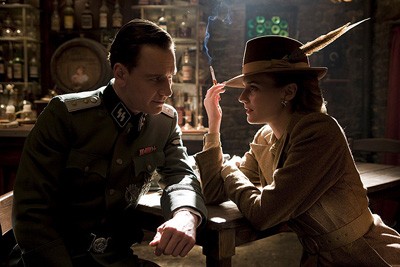
Jamie S. Rich is a novelist and comic book writer. He is best known for his collaborations with Joelle Jones, including the hardboiled crime comic book You Have Killed Me, the challenging romance 12 Reasons Why I Love Her, and the 2007 prose novel Have You Seen the Horizon Lately?, for which Jones did the cover. All three were published by Oni Press. His most recent projects include the futuristic romance A Boy and a Girl with Natalie Nourigat; Archer Coe and the Thousand Natural Shocks, a loopy crime tale drawn by Dan Christensen; and the horror miniseries Madame Frankenstein, a collaboration with Megan Levens. Follow Rich's blog at Confessions123.com.
|
| Popular Reviews |
| Sponsored Links |
|
|
| Sponsored Links |
|
|
| Release List | Reviews | Shop | Newsletter | Forum | DVD Giveaways | Blu-Ray | Advertise |
|
Copyright 2024 DVDTalk.com All Rights Reserved. Legal Info, Privacy Policy, Terms of Use,
Manage Preferences,
Your Privacy Choices | |||||||









